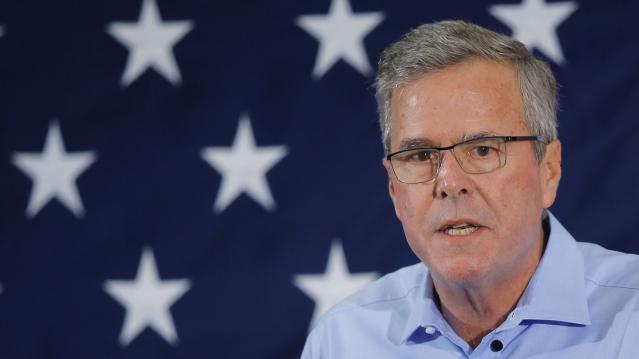Jeb Bush Fires Back at Trump, but Is Anyone Listening?

Despite the sizzling Summer of Trump, Jeb Bush and the rest of the Republican establishment still don’t get it.
Bush just released an 80-second video entitled “The Real Donald Trump”, as flagged by Mike Allen in his Politico Playbook note this morning, in a slick effort to attack Trump by using his own words against him. That’s a classic campaign tactic, of course, and the effort by the Bush campaign is aimed at painting the bombastic real estate mogul from New York as a fake conservative – someone whose core values and views are anathema to Republicans in Iowa, where the Real Clear Politics poll average puts Trump in the lead for the GOP Caucuses with 21.3 percent.
Related: Two New Polls Show Exactly Why Donald Trump Is Winning
Here’s a sampling from the video:
Talking to Tim Russert on Meet the Press, 1999:
- “I’ve lived in New York City and Manhattan all my life, so you know my views are a little bit different than if I lived in Iowa.”
- “I am very pro-choice. I am pro-choice in every respect.”
From a 1999 Fox News clip:
- “As far as single-payer [heathcare system], it works in Canada. It works incredibly well in Scotland.”
Talking to Wolf Blitzer on CNN:
- Who would you like representing the United States in a deal with Iran? “I think Hillary would do a good job.”
- Do you identify more as a Democrat or a Republican? “Well, you’d be shocked if I said that in many cases I probably identify more as a Democrat.”
From a 2001 Fox News clip:
- “Hillary Clinton is a terrific woman. I’m a little biased because I’ve known her for years.”
Some of the clips are 15 years old or older and show Trump for what he was: a New Yorker with unremarkable New York liberal/centrist positions on a lot of issues.
Related: Fiorina PAC: CNN and GOP Are Conspiring Against Carly
The big question for Bush and other Republican politicians in the race is: Does it matter that much where Trump once stood or even where he now stands? If it doesn’t, that is going to make taking him down even more difficult.
What Trump is selling is unvarnished authenticity to an electorate tired of politicians who try to be all things to all people. You’re not going to catch Trump courting the gun crowd by saying he likes to hunt small varmints, like the patrician Mitt Romney did. Or donning a Rocky the Squirrel hat and riding around in a tank like Mike Dukakis did in 1988 to try to show he could be a credible commander-in-chief.
Mad-as-hell voters are sick of phoniness and goofy photo ops. When will the career politicians get that?
Map of the Day: Navigating the IRS

The Taxpayer Advocate Service – an independent organization within the IRS whose roughly 1,800 employees both assist taxpayers in resolving problems with the tax collection agency and recommend changes aimed at improving the system – released a “subway map” that shows the “the stages of a taxpayer’s journey.” The colorful diagram includes the steps a typical taxpayer takes to prepare and file their tax forms, as well as the many “stations” a tax return can pass through, including processing, audits, appeals and litigation. Not surprisingly, the map is quite complicated. Click here to review a larger version on the taxpayer advocate’s site.
A Surprise Government Spending Slowdown

Economists expected federal spending to boost growth in 2019, but some of the fiscal stimulus provided by the 2018 budget deal has failed to show up this year, according to Kate Davidson of The Wall Street Journal.
Defense spending has come in as expected, but nondefense spending has lagged, and it’s unlikely to catch up to projections even if it accelerates in the coming months. Lower spending on disaster relief, the government shutdown earlier this year, and federal agencies spending less than they have been given by Congress all appear to be playing a role in the spending slowdown, Davidson said.
Number of the Day: $203,500

The Wall Street Journal’s Catherine Lucey reports that acting White House Chief of Staff Mick Mulvaney is making a bit more than his predecessors: “The latest annual report to Congress on White House personnel shows that President Trump’s third chief of staff is getting an annual salary of $203,500, compared with Reince Priebus and John Kelly, each of whom earned $179,700.” The difference is the result of Mulvaney still technically occupying the role of director of the White House Office of Management and Budget, where his salary level is set by law.
The White House told the Journal that if Mulvaney is made permanent chief of staff his salary would be adjusted to the current salary for an assistant to the president, $183,000.
The Census Affects Nearly $1 Trillion in Spending

The 2020 census faces possible delay as the Supreme Court sorts out the legality of a controversial citizenship question added by the Trump administration. Tracy Gordon of the Tax Policy Center notes that in addition to the basic issue of political representation, the decennial population count affects roughly $900 billion in federal spending, ranging from Medicaid assistance funds to Section 8 housing vouchers. Here’s a look at the top 10 programs affected by the census:
Chart of the Day: Offshore Profits Continue to Rise

Brad Setser, a former U.S. Treasury economist now with the Council on Foreign Relations, added another detail to his assessment of the foreign provisions of the Tax Cuts and Jobs Act: “A bit more evidence that Trump's tax reform didn't change incentives to offshore profits: the enormous profits that U.S. firms report in low tax jurisdictions continues to rise,” Setser wrote. “In fact, there was a bit of a jump up over the course of 2018.”




